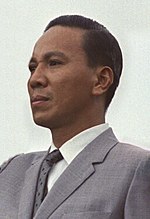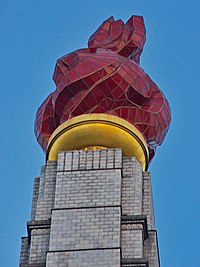Tự Ý Chí
Self-Will Ideology, commonly known as Tự Ý Chí (自意志) or sometimes Hoangism, is a political ideology of Nainan, it has been the continuous state ideology of Nainan since the foundation of the Harmonious Republic of Nainan in 1956. It centers around the teachings and writings of Hoàng Viện Trai, a Nainese military officer and professor who eventually founded the Nainan People's Solidarity and Longevity, a political party that centers around the ideology. It is mostly nationalist in nature calling for an independent and self-sufficient Nainan free from control of the Euclean powers, both capitalist or socialist. It encompasses that the state must ensure that Nainan remains this way for all time, and is very authoritarian. It rejects what it considers "Euclean colonial ideas", such as liberalism, individualism, and social democracy. It adopts various socialist ideals as well, including state planned economy, neosocialism, and trade unions, but rejects other aspects of other socialist states, such as left-wing progressivism, which it considers another tool of Euclean influence. Socially is generally right-wing, supporting traditionalism, social conservatism, and nationalism. Another major part of the ideology is the advocacy for national independence from foreign influence. It is heavily inspired by the National Principlism of Shangea and the Sattarism of Zorasan.
The ideology has been the state ideology of Nainan and currently continues to be, though it has branched out into smaller subsects, some being more liberal, others being more authoritarian. Symbols of Tự Ý Chí include the Golden Star, and the tuổi thọ symbol, representing longevity and life.
History
Creation

Hoàng Viện Trai is credited by most to be the central creator of first believer in Tự Ý Chí. After the Great War the Weranian Nainese Commissariat was beginning to gain autonomy from Werania. Hoàng served in the colonial army as an officer and wrote many anti-Euclean notes in his journal, and he dreamed of an independent Nainan. In his writing he wrote about various ideologies he was exploring, especially socialism and national principlism. In 1953 the colony gained independence as the Kingdom of Nainan, ruled by Thang Con, who was the monarch under colonial rule, who promised a constitution and appointed a Premier. These however fell short quickly and anti-monarch sentiment began to grow.
During this time Hoàng became a professor at Canhdong Royal College. Here he would make many writings on what he believes is what is needed to "free Nainan" from Euclean colonial influence and form a "strong society" in Nainan, and began to formulate his ideology which became known as Tự Ý Chí in 1954. He centered around advocating for total sovereignty of Nainan, authoritarian emphasis on traditionalism, and abolishment of class conflict. Later that year he and like-minded peers formed the Nainan People's Solidarity and Longevity, which centered around his ideology.
His many works included Reviving the Dragon of Nainan, which discussed that the Kingdom was weak and needed a republican authoritarian system to take over. He also wrote Reflections on the Civil War in 1971, which discussed his leadership during the Nainese Civil War. His main work however is Self-Will Ideology, which discusses the full ideals of Tự Ý Chí.
Late 20th century

21st century

Principles
Independence
One of the forefront ideals of Tự Ý Chí thought is Giải quyết (解決), which translates to resolve. It means that in order for Nainan to continue to exist as a people and a nation the country must rid itself of foreign influence, particularly from Euclea. These include things such as liberalism, individualism, and progressivism. According to Hoàng Viện Trai, the Nainese people can only work with homegrown Nainese ideology, and that other cultures and their ideologies will only destory Nainan's culture and independence. Hoàng states that "Nainan is Nainan and we are what we are, the Nainese people need a movement that fits their customs and ideals accordingly. There are neocolonial ideological forces that are subversive to our very culture and sovereignty. For Nainan we must create our own ideas for our own sake, and not for any other's."
According to Hoàng Viện Trai, both capitalist and socialist states and their influence were both under the idea of "subversive ideologies". Hoàng believes that the nations Nainan should have closer relationships with are those of similar cultures, mainly being Nainan's neighboring states, including nations such as Shangea, Lavana, or Kuthina. He believes that because they have similar cultures, they are more "understanding" of the people of Nainan and more acceptable countries to be open with. Tự Ý Chí considered Shangea to be Nainan's greatest ally and partner, Hoàng called the friendship "a brotherhood of two dragons".
Nainese democracy
Tự Ý Chí rejects the idea of liberal democracy, but supports the basic idea of democracy itself. According to Hoàng, he believed in a "strong state, but the state is only strong when it works to understand all of it's people." He stated that to maintain a sovereign and strong state, Nainan must adopt it's own form of governing unique to itself. Hoàng called it Nainese democracy (民主奈人), which used the idea that the government must maintain the nations culture by using the voice of the sectors of the people to formulate a culturally fit solution, some have called this a semi-democracy or guided democracy of sorts, as it doesn't necessarily allow full popular sovereignty over the state's decision, and that in the end the state has the say on all matters.
Elections in Nainan are not set to a standard occurance and only can happen with the consent of the Central Council, despite this authoritarian measure, the Central Council has continued to allow elections on a somewhat regular basis, with some discrepancies. Another policy established top allow a regular change in leadership is that tenures of over 20 years in Nainan are not allowed. Nainan today is often called a Southern democracy by some.
Nationalism
Tự Ý Chí advocates for the emphasis of nationalism. It claims that the people and state must support the national identity or face soul-crushing annihilation, the nation is often referred to as the Motherland (坦媄; đất mẹ). Hoàng stated that "The state and the identity of the Nainese people must be together, our prosperity and harmony is threatened if the nation's culture becomes insignificant to the state, and eventually the people. The state must promote the national identity of Nainan and put it's people first, at home and even abroad, it's interest must commit to the betterment of the nation that upholds it."
Socialism
Tự Ý Chí is supportive of socialism in some of it's aspects, while it rejects other parts of it. Tự Ý Chí supports socialism as a means of attaining Nainese independence from foreign control and creating what Hoàng calls "Harmony of State and People". Tự Ý Chí supports the idea of a collective command economy, it also supports trade unionism and advocating for workers' interests. It however rejects other ideals of socialism such as ethical socialism and social democracy. It is also against the idea of class conflict itself, and believes that class should not exist in a "Harmonious society", claiming class division is purely Euclean influence. Hoàng states that "class should be abolished by the state, and economy run in the interests of the state and it's people."
Elemental Motherland
The idea of the Elemental Motherland (坦媄原素; đất mẹ nguyên tố) brings in aspects of Badi and some Zohist elements. It is the thought that Nainan works like the badimua of Badism, each sector of society an element that evolves and has subsects within it, the nation itself as the essence (渃花; nước hoa) of the people, without the elements, the essence of the nation becomes broken and collapses. Each part of society must work in it's specific duty to the nation, and that each soul of a citizen is apart of a collective national soul, with the idea that "the soul belongs to the nation" and will reconstitute itself into the elements of the nation when it accepts serving the state. This idea is often taught in Badi temples in Nainan but is not commonly accepted in other Badist nations like Lavana and Dezevau. This part of the ideology is commonly seen as a badist justification of collectivism and nationalism. Citizens who do not go along with the essense of the nation are referred as being following the way of the bright lord (主宰平明; chúa tể bình minh), as in the Zohist entity Tsumin and must appease the nation or face falling out from society. The idea of the body belonging to the state has been used to justify state actions in both negative and positive manners, such as justification of torture methods, to justification of social services.
National Principlism
Trai considered National Principlism his central ideological backbone for creating what is Tự Ý Chí. It support the idea of a technocratic planned economy in a similar way to Shangea, although with slightly more emphasis on economic self-sufficiency. It rejects the idea of private property, liberalism, and individualism with the idea that the people belong to the nation, and the state. It also accepts some aspects of legalism, with the idea that if the people follow the correct way of life, the state will not have be strong in order to keep it in line, therefore the state must enforce morality for the people. The idea of the final and correct mandate of heaven will occur under the rule of the NPSL is taken directly from Shangean National Principlist thought. Due to ideological similarities, Shangea and Nainan are close allies. Many consider Tự Ý Chí to be a subsect or offshoot of National Principlism, other consider it a separate ideology, in reference to the influence of Sattarism on Trai's works as well.
Criticism
Many who criticise similar ideologies like National Principlism have similar critiques of Tự Ý Chí, Shangean political scientist Jiang Jiqing has said that "Tự Ý Chí is a bland ideology that takes much inspiration from it's Shangean counterpart, it is a pale façade of a strong ideology that leaves little to actually serve the people, it does not follow itself in a serious manner in Nainan. It seems to only self enrich the nation's rulers and subvert the people in the end."
Some critics have compared the ideology to National Functionalism, based around the ideology's rejection of both capitalism and socialism and sense of a strong state that promotes the nation's culture and ideals above anything else. The only aspects of Gaullican functionalism missing in Tự Ý Chí is the sense of revanchism, this is due to an absense of revanchist sentiment in Nainese history.

